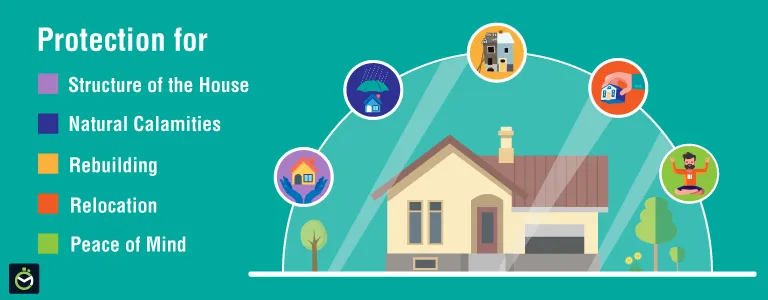Home insurance is a kind of insurance that helps protect your house from unexpected damages that might happen to its structure. Home insurance is also known as homeowner’s insurance. When it comes to the Home insurance policy there are various policies which are present in the market but to choose the right one is quite confusing. In this article, we will help you to how to choose the right Homeowner’s policy by providing the following steps.
Steps to Follow:
1. Understand Your Needs
2. Budget Wisely
3. Assess Risk Tolerance
4. Compare Quotes
5. Understand Policy Exclusions
6. Investigate the Insurer
7. Seek Professional
Table of Contents
1. Understand Your Needs
Before getting into the policy details, let’s look into some requirements you need before diving into the policy.

1. Home Value: Before you choose an insurance policy for your home, it’s a good idea to figure out how much your home is worth. Think about any improvements or renovations you’ve made recently because they can make your home worth more. This will help you make better choices when it comes to picking the right insurance coverage for your home.
2. Personal Belongings: Keeping track of all your belongings by making a list of them and determining their value is crucial. It helps you understand what you own and its value and can help you in case of theft, damage, or loss of any item. Having a record of your possessions can also help you process your insurance claim quickly, and keep track of your items if you lend them to someone, or move to a new place. It’s important to include even the items that don’t hold significant monetary value as they can be costly to replace. Documenting your personal belongings is an essential task that can save you a lot of trouble and money.
3. Liability Concerns: It’s really important to think about the possible risks that come with owning a property. For instance, let’s say that your driveway gets icy and a visitor slips and falls. This kind of accident could lead to some serious legal and financial troubles. To protect yourself from these risks and make sure you’re prepared for any unexpected incidents, it’s a good idea to get liability coverage. That way, you can be confident that you’re covered in case something goes wrong.
2. Budget Wisely
Choosing policies that work for you is important, but it’s just as crucial to consider your budget in the process. You don’t want to find yourself in a situation where you’re implementing policies that exceed your financial capacity. It’s essential to strike a balance between policies that meet your needs and don’t break the bank.
1. Premiums
What are premiums? : These are the regular payments you make to your insurance company.
- Balance it right: It’s really important to keep in mind that selecting lower-priced insurance may mean that you receive less coverage. It’s best to find a balance between affordability and protection, without endangering your safety for the sake of a cheaper rate. By picking a policy that offers enough coverage for your needs, you can make sure that you’re well-protected and have a sense of calm, knowing that you’re not at risk if something unexpected happens.
2. Deductibles
What are deductibles?
These are the out-of-pocket expenses you pay when making a claim.
- Choose wisely: When you’re picking out a deductible for your insurance policy, it’s important to think about your finances and choose an amount that you can manage without any trouble. Think of it as setting some money aside, so you have a safety net in case something unexpected happens. By doing this, you can feel confident that you’re protected in case of an emergency, without having to worry about putting too much pressure on your finances.
3. Coverage Limits
What are coverage limits?
These define the maximum amount your insurance will pay for a claim.
Match your situation: When you’re shopping around for insurance, it’s crucial to ensure that it fits your financial standing. You wouldn’t want to go for policies that are too costly for you, but at the same time, you don’t want to be underinsured and be caught in a difficult situation if something unfortunate happens. The key is to find a balance between the two so that you have sufficient protection without putting your finances in danger. Take some time to evaluate your budget and select the coverage that’s most appropriate for you.
3. Assess Risk Tolerance
When choosing the right home insurance policy, it’s crucial to assess your risk tolerance. This involves understanding your comfort level with risk.
- High Deductibles: If you’re willing to take on a bit more risk, you may be able to reduce your insurance premiums by opting for a higher deductible. A deductible is the amount you must pay out of pocket before your insurance policy kicks in. Choosing a higher deductible can lead to immediate savings on your monthly payments. However, it’s important to remember that if you do need to file a claim, you’ll be responsible for covering a larger portion of the total cost. So, while opting for a high deductible can be a smart financial move in some cases, it’s important to weigh the potential long-term costs against the short-term savings.
- Comprehensive Coverage: If you like to be safe and don’t want to take any risks, then it’s a good idea to get comprehensive coverage when buying insurance. This type of coverage gives you more protection against different types of accidents and damages. It may cost more, but it’s worth it because it gives you peace of mind knowing you’re covered for many potential problems.
4. Compare Quotes
In choosing the right home insurance policy, it’s essential not to rush into accepting the first quote you receive. Instead, take the time to shop around and compare quotes from different insurers.
- Online Tools: Use online comparison tools to explore multiple quotes from different insurers. Since there are multiple insurers available it is best to compare them.
- Coverage Consistency: When comparing quotes, it’s important to ensure consistency in the types of coverage and the coverage limits across different insurers. This means that you should be comparing similar policies to get a true sense of which insurer offers the best value.
- Avoid the Lowest Premium Trap: while it might be tempting to go for the policy with the lowest premium, this can sometimes be a trap. A lower premium often means less comprehensive coverage, which could leave you underinsured in the event of a claim. Therefore, it’s crucial to look beyond just the premium and consider the extent of the coverage offered.
5. Understand Policy Exclusions
In the journey of selecting the right home insurance policy, understanding policy exclusions is a critical step. These are specific situations or items that your policy won’t cover, and they can often catch you off guard if you don’t read the fine print.
- Natural Disasters: One common type of exclusion involves natural disasters. While it might seem logical to assume that your home insurance would cover damage from all types of natural disasters, this isn’t always the case. Some policies specifically exclude certain types of natural disasters, such as floods or earthquakes. If you live in an area prone to these types of events, you’ll want to ensure your policy covers them or consider purchasing additional coverage.
- High-Value Items: Check if your policy covers valuable items like art, antiques, or collectables. If you own valuable items like art, antiques, or collectables, don’t assume that your standard home insurance policy will fully cover them. Many policies have limits on the coverage for these types of items, and you may need to add additional coverage to ensure they’re fully protected.

6. Investigate the Insurer
In the process of choosing the right home insurance policy, it’s not just the policy details that matter – the reputation and reliability of the insurer are equally important.
Firstly, consider the financial strength of the insurer.
Secondly, Lastly, In conclusion, investigating the insurer is a vital step in choosing the right home insurance policy. By considering the insurer’s financial strength, customer service, and available discounts, you can find a reliable insurer that offers a policy suited to your needs.
- Financial Strength: Research the company’s financial stability. It’s crucial to choose a company that is financially stable and capable of paying out claims, especially in the event of a large-scale disaster. You can research the financial strength of insurance companies through rating agencies like A.M. Best or Standard & Poor’s.
- Customer Service: Pay attention to the insurer’s customer service. Read reviews from other customers to get a sense of their experiences, particularly with the claims process. A company that offers excellent customer service can make the claims process smoother and less stressful.
- Discounts: Don’t forget to inquire about potential discounts. Many insurers offer discounts for various reasons, such as bundling home and auto insurance, installing security systems, or being claim-free for a certain period. These discounts can significantly reduce your premiums.
7. Seek Professional Advice
It can be tough to figure out what home insurance policy to pick. It’s not just about finding the cheapest one, but also understanding the details of each policy and how they can protect your home. That’s why it’s important to get help from an insurance agent or broker. They know all about home insurance policies and can give you advice tailored to your specific needs. They can explain the confusing parts and help you decide which policy is right for you.
By getting professional help, you can make a good choice and pick the policy that works best for you. Remember, every home and homeowner is different, so it’s important to get advice that’s personalized to you. In short, when you’re choosing a home insurance policy, don’t forget the value of expert advice. It could be the difference between an okay policy and one that’s perfect for you. So, if you’re not sure, talk to a professional.

Conclusion
In conclusion, picking the perfect home insurance plan is a very important choice that needs to be made with a lot of thoughtfulness. It’s not only about the price you pay but also about knowing what’s covered and how it applies to your specific circumstances.
We have provided you with certain steps that you might need to keep in mind to choose the right policy for yourself. Ultimately, the goal is to secure a policy that offers comprehensive protection for your home, providing you with peace of mind.
Selecting the ideal home insurance policy may seem like a big task, but with the right guidance and information, it can be a straightforward and satisfying experience.

